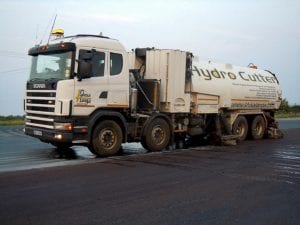Deane Koekemoer, general manager for Shisalanga Construction, talks to IMIESA about the company’s turnkey penetration strategy in the asphalt supply and flexible pavement markets, where its unique offerings are delivering results.
 What sets Shisalanga apart from the competition?
What sets Shisalanga apart from the competition?
DK From the onset in 1998, we’ve always had a passion for innovation. In the beginning, this was often a necessity to gain a foothold into new markets, and to sustain ourselves in existing ones. However, our willingness to try new things has subsequently become a central focus. It’s also definitely been a key element of our success since it ensures that we stay relevant. Our dedicated team of specialists has extensive experience in rolling out turnkey projects. In fact, we cut our teeth on the N3.
In 2015, National Asphalt acquired 60% of Shisalanga (the remaining 40% is owned by Crossmoor Transport (Pty) Ltd, so we also support Raubex construction projects when they fall within our territorial scope.
Could you provide specific examples of innovation?
One of our most successful breakthroughs has been the introduction of Steel Flow – a proprietary technology developed by Harsco in the UK. As the name implies, the product contains a high percentage of steel slag – a downstream industrial by-product. Steel Flow is a highly cost-competitive solution when compared to conventional UTFC (ultra-thin friction coarse) asphalt applications, which have become a popular choice for Sanral projects. Since Steel Flow was originally developed for UK and European applications, we needed to carry out some binder modifications to meet South African requirements. A series of trials enabled us to adapt the product to local conditions. One of the key modifications was the eventual bitumen binders selected. The use of modified bitumen gives the material greater flexibility and elasticity. While UTFC layers are typically 18 mm to 20 mm thick, Steel Flow only needs to be laid at a thickness of 15 mm, which results in faster installation times, reduced labour and greater surface coverage for the same equivalent amount of material. Plus you don’t require the expensive self-tacking pavers needed for UTFC projects. Like UTFC, Steel Flow also exhibits excellent skid resistance. Steel Flow recently passed a major trial phase. Can you expand on this?
Steel Flow recently passed a major trial phase. Can you expand on this?
We’re proud to say that the trial section we paved in Jozini, KwaZulu-Natal, some two years ago, is still showing no signs of wear. For this construction project, we needed to haul the material some 380 km from Newcastle to site, but there wasn’t any loss in terms of quality. The final inspection was completed in November 2017 and passed all the requirements stipulated by the consulting engineers and local roads department.
A section of this road even turned out to be fireproof when subjected to burning tyres during a service delivery protest, which was an unexpected bonus.
In terms of recent projects, during 2017, we supplied 8 000 tonnes of Steel Flow modified asphalt for a project in Dundee on behalf of the KwaZulu-Natal Department of Transport (KZN DOT). The feedback has been very positive.
The KZN DOT now intends to run a series of trial sections in the Pietermaritzburg andDurban areas.
What’s the current and future territorial expansion strategy?
Our headquarters are in Glencoe, KwaZulu-Natal, and this province has historically been our main base of operations, but it’s a large area to cover. Our goal is to identify and set up new asphalt plants in key towns within KwaZulu-Natal, alongside broader national expansion plans.Currently, we have asphalt plants in Dundee, Newcastle, Estcourt, Ulundi, and Shakaskraal, all of which are situated in KwaZulu-Natal.
We will be setting up a new asphalt plant in East London during the first quarter of 2018. We believe there’s extensive scope within the Buffalo City region for urban, provincial and Sanral-related projects. Another exciting development is the establishment of an asphalt plant in Hluhluwe to target opportunities in the far northern region of KwaZulu-Natal. This plant is scheduled for commissioning around March 2018 and, once set up, will extend our footprint north to Kozi Bay, some 2 km from the Mozambique border.What are the key challenges for asphalt contractors?
The market is experiencing rapid change in terms of infrastructure priorities, with a major emphasis on the maintenance of existing roads ahead of new construction projects. Given our business model, we are perfectly positioned to meet these opportunities. Our highly flexible and ‘lean team’ approach, coupled with a comprehensive paving fleet and our well-appointed asphalt plants, means we can rapidly mobilise and execute contracts in any part of the country. We are also seeking joint venture opportunities with SMME contractors wishing to grow their penetration in the paving segment. What are your key market offerings?
What are your key market offerings?
We offer the complete solution, ranging from hydro-cutting technology to deep in situ stabilisation, crack and slurry sealing, and chip and spray applications. In addition to our compaction and paving machines, we also have crack-sealing units, and distributor trucks.
When it comes to hydro-cutting, we definitely believe we have the competitive edge in the local market. These machines fill a huge void in many facets of the road industry with regard to surface texturing, rubber and spillage removal. With hydro-cutting, you have so much flexibility: you can wash the surface, or open up the pores. For example, chip and spray surfaces can become flushed and hydro-cutting is a greatand efficient way to retexture these surfaces. Our recent contract at King Shaka International Airport is a good example of how to retexture an open grade using hydro-cutting. Typically, the mastic on open-grade asphalts is stone on stone and, with time, the binders can close the pores. The end result is that the texture depth is no longer optimal. But with hydro-cutting, it’s a simple process to restore the surface.
Where are you working at the moment?
Recent and current projects include work in Escourt, Ladysmith, and Ulundi. These entail a mix of supply and paving contracts. We’re also working on a hydro-cutting project in Mossel Bay. The scope here comprises approximately 100 000 m2.Are you planning to tender on larger projects?
Definitely. With the knowledge and experience we have at Shisalanga, we are determined to challenge ourselves by targeting larger projects.What would you like to say in closing?
The industry experienced tough trading conditions during 2017. Despite this, Shisalanga had a good year and we are highly optimistic about the prospects leading into 2018. Government remains committed to infrastructure investment, which is one of the most important driving forces in revitalisingthe economy.







